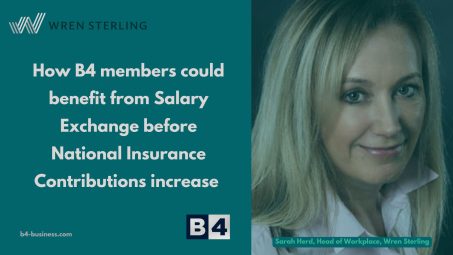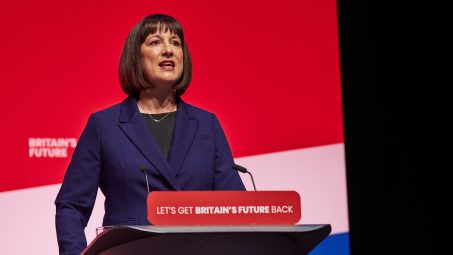
Bank of England raises interest rates for fifth consecutive time
B4 members comment on the impact it could have on their businesses.
Economists predicted correctly that the Bank of England (BoE) would raise interest rates by a quarter percentage point today (THURSDAY).
The BoE made the announcement of a quarter percent rise – the fifth consecutive rise in rates at lunch time taking the rate to 1.25 percent.
Inflation, the increase in prices for goods and services, is currently running at its highest level in four decades at 9 per cent and the BoE is under growing pressure to tame it.
There are warnings it could top 10 per cent later this year – hence the new hike.
According to some analysts, including the head of investment analysis at AJ Bell, Laith Khalaf, this could increase the risk of recession.
The last rise was just last month when rates increased from 0.75 per cent to 1 per cent. Today’s announcement means rates are now at their highest since 2009.
Areas the latest increase will impact upon include:
- Finance experts, including TVs Martin Lewis, say variable rate mortgages will go up by £12 a month per £100,000 worth of borrowing
- Raising the interest rate is one way to curb inflation. It is aimed at making borrowing more expensive and encouraging people to spend less
- Raising the interest rate makes mortgages and loans more expensive but on the flip side, increases the return on savings
- Stateside, the US central bank announced its biggest rate hike in nearly 30 years to tackle surging inflation.
B4 contacted some of its Shropshire and Oxfordshire members for comment on today’s news to find out what impact the latest interest rate hike could potentially have on their business and what steps they will be taking to mitigate these effects.
Frank Nigriello, Chairman of B4 and Director of Corporate Affairs at Unipart, cited the importance of companies working more closely together to find ways of addressing financial challenges.
“Businesses are already facing pressures from rising costs on raw and finished materials, as well as increases in fuel and energy costs and higher expectations in terms of wages. An interest rate hike is likely to severely impact those businesses with limited cash flow.
“It is increasingly important for businesspeople to share innovative solutions and best practice in cost reduction with other companies in the B4 network, so that we can all contribute to a more resilient local economy,” he said.
Professor Tim Vorley, Pro Vice-Chancellor & Dean at Oxford Brookes Business School, has spoken out about the cost -of-living challenges to UK families and says the rise in interest rates so far has not curbed inflation.
“Rising interest rates have so far failed to counter inflation. Households are already feeling the pinch with the cost-of-living squeeze, but businesses have proven resilient in what continue to be challenging times but encouraged businesses to ‘hold on.’
“Despite today’s increase in the interest rate, we need businesses to hold the on to their optimism as they look to the future. With interest rates looking set to rise even further, planning is crucial.
“From reviewing spending to rethinking investment decisions and ensuring the stability of supply chains – now is the time! We know interest rates hikes hit small businesses hard, and for now they are only going in one direction.”
Financial experts have said that increased borrowing costs would be “extremely likely” to slow demand for property, which would in turn cause property price growth to slow, according to mortgage brokers.
Russell Griffin MNAEA, Director of Samuel Wood in Shropshire, said: “We have experienced, recent and dramatic house price inflation within Shropshire as the area is targeted as a destination county for thousands of potential purchasers who covet a different lifestyle, attracted by the beautiful countryside, cafe cool towns & excellent commuting links to the Midlands and North West.
“The steady incremental increases in interest rates have started to impact on the housing market. It seems every TV or Radio Show is extolling the fear of the cost-of-living squeeze, and this, coupled with interest rate increases affects market sentiment and buyer behaviour.
“That being said, the market is still extremely buoyant as demand outstrips supply, and although increasing, mortgage borrowing is still an affordable option for the overwhelming majority who value quality of living against market turbulence. I would advise buyers and sellers to continue and my sector to hold on. We have certainly been through worse.”
Rowan Waller, of Wallers Estate Agents in Oxford, agreed that house prices had not yet slipped due to the current high demand, but expected it might come summer. He said he predicted this would not actually be a dip in a price, more of a levelling off.
“In our industry, we watch these rises closely as there is a real-time correlation with what happens to mortgage rates, with an immediate impact, in theory, on a mortgaged buyer’s ability to proceed on a purchase at a given price.
“I say ‘in theory’, as presently, despite a significant increase in rates already this year – the demand for property has remained exceptionally high compared to supply, and as a result property values have not noticeably started to slip.
“I do expect however, that as we head into the summer holiday, more housing stock will become available, the level of demand will drop accordingly and, compounded by rising interest rates, we will see prices starting to head downwards, accompanied by a public sense that this indicated a falling housing market.
“In reality this will be more truthfully a correction to what has been an over inflated market over the past fifteen to eighteen months, and my expectation is that property price growth will still level out at something like 3 or 4 per cent this year.”
Stuart Crook, Partner at Wellers Accountants in Oxford added: “Years of low inflation, and near 0 percent interest rates, created an economy which benefitted investors and asset owners most. Now, circumstances are reversing, with inflation standing at 9 percent and the Bank of England raising rates to 1.25 percent to combat the steep increases. Some would argue that we should accept the rises as a post-Covid consequence. Indeed, it can also be argued that the balance needed addressing sooner or later, with some economists predicting this back in 2020.
“Regardless, the current inflation rises all feed into a theory called ‘inflationary psychology’, where two things can happen. Either consumers speed up purchases or seek higher wages in fear of price rises. Or, businesses raise their prices, anticipating increased costs.
“The difficulty here is that giving wage increases or raising prices to deal with future inflation, causes more inflation, and so the cycle begins again.
“The Bank of England could have acted earlier and mitigated against the initial panic. But regardless, businesses must carry on. The challenge will be maintaining tight fiscal discipline. They should focus on careful budgeting, rigid cost controls, and regular financial reporting to prevent strain on profit margins as payroll costs increase.”
Find out more about B4 visit www.b4-business.com
Become a member of B4 Oxfordshire, contact CEO Richard Rosser at richard@b4-business.com
Become a member of B4 Shropshire, contact Victoria Charnley, regional director B4 Shropshire at victoria@b4-business.com
Find us on LinkedIn at b4-business
More in Finance

How B4 members could benefit from Salary Exchange before National Insurance...
Sarah Herd, Head of Workplace, Wren Sterling

UK Bond Market: What You Need to Know
The UK government bond market is once again making headlines as yields on longer-term debt surge to levels not seen in decades. This latest development has raised concerns among investors and policymakers, presenting significant challenges for the government’s fiscal plans.

B4 Finance Ecosystem: The specific opportunities and challenges that women encounter...
Charles Stanley are committed to fostering a proactive approach to investing and their goal is to empower women to make well-informed financial decisions and capitalise on potential growth opportunities. They also strive to support women in crafting their unique financial narratives, enhancing their knowledge, and understanding of investment strategies, and building a robust and influential female network.
From this author

Careys Construction Campus at Oxford North’s inaugural student cohort celebrates their...
The first students to take part in the pilot Careys Construction Campus at Oxford North, the free three-week training course for people aged 17 years and over, have graduated with flying colours.

B4 Reviews – with Ruth Hawkins
Richard has recently asked me to find and lead a small team of reviewers from the B4 community, so over the next few weeks I will be looking to build that team and also looking for venues, events and activities from within the B4 network and beyond to write some reviews!

Get Support Announced as B4’s Official IT Partner
We are delighted to announce that Oxfordshire’s leading IT Services provider, Get Support, have become B4’s Official IT Partner.




